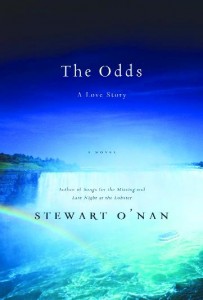Two books take place simultaneously within the slim confines of Stewart O’Nan’s new novel The Odds. One tells the story of a failed marriage, its two unhappy principals not filled with hate for each other, but worn down by their own and their partner’s mistakes and weaknesses. The other explores how desperation can drive people to take enormous chances, discovering in themselves the possibility of courage and the capacity to reject what fate seems determined to do to them.
Art and Marion Fowler are running away, fleeing, we are told in the book’s opening lines, toCanada. Art has lost his job, their house is being foreclosed upon, and the denial of their dire circumstances in which they have lived will no longer support the weight of reality. But they aren’t heading north to disappear. Instead, Art has converted most of their remaining assets to cash in order to gamble it all on the roulette tables of a casino atNiagara Fallsin a desperate attempt to win back what they’ve lost.
But they’ve lost a lot more than money.Marionis still deeply wounded by Art’s infidelity, an affair that took place decades before and for which Art has been doing penance ever since. O’Nan deftly weaves the present and the past together, slowly revealing Art’s motivations and bottomless guilt, and over the chapters that move back and forward in time he paints a pointillist picture of nor just Art’s indiscretion, but of their entire married life. Art loves his wife deeply, yet he was capable of betraying her, and O’Nan doesn’t try to resolve this apparent paradox because he knows there is no resolution beyond the fact that Art is flawed, complex and not completely self-aware or totally in control. In other words, he’s human.
Whether this means he ought to be forgiven isMarion’s decision, and O’Nan sees her as the most tragic and sympathetic character in the text. She is still angry, and probably always will be, but is hardly guiltless herself. The divorce they are planning is ostensibly for financial reasons, butMarionsees it also as a final cutting of the cord, a way to get on with her life. Yet despite everything she still loves her husband, and she is tired of her anger and her suspicion even as she sees forgiving him and letting go of her pain as a personal failure. This pain is not all there is toMarion, but it is so deeply entrenched in her psyche that she runs the risk of allowing it to define her. The relationship between these two very real people, their intimate knowledge of each other’s quirks, preferences, weaknesses and strengths is shown skillfully in the fluid shifts in tone and mood that O’Nan effects through the slightest turn of a word or phrase in what anyone watching from the outside would see as a totally innocent conversation.
All this is set against the backdrop ofNiagara Fallsand Art’s crazy plan. A love letter to the Falls this book certainly is not, and O’Nan (I cannot help but suspect for comic relief) seems almost gleeful as he skewers the kitschy tourist traps and even kitschier tourists Niagara has fattened itself on for a hundred years. BringingMarionback to the site of their honeymoon, Art hopes to rekindle the dying embers of their marriage. He perseveres despite the thousand little inconveniences and small failures that tend to plague budget tourists: the lost reservation, the bad dinner that results in stomach upset, the too-long line for the much-anticipated attraction. A heart concert at the casino, complete with drugs, sex and the spectacle of middle-aged baby boomers rocking arthritically to the soundtrack of their lost youth is the saddest and funniest episode of the text, and it shows vividly one of O’Nan’s minor but complementary points: traveling is fun, but it is also a good course in dealing with disappointment.
The disappointments Art andMarionexperience on this trip, while always minor, reflect metaphorically the slow, small, disappointing dissolution of their life together, a life Art and perhaps unconsciously evenMarionwishes they could resurrect. The odds are against them, and they know it. But they try and, win or lose, in trying they achieve a kind of success. So does The Odds.


